|
THE MILESIAN PHILOSOPHERS
Thales, Anaximander, and Anaximenes

THALES OF MILETUS
(624-545
BCE)
The Abyss
1.
Water is the basic nature of reality. (material monism)
2. All things
are full of gods.
.............................................
1. He was the
first to ask: what is the basic nature of reality?
He took the step from
mythology to science and philosophy.
2. In 1925 we
thought everything was made of hydrogen which is two
thirds water.
............................................
EPOCH:
Born Phoenician
Miletus citizen
Slavery existed
there.
The poor murdered the
wives and children of the rich.
The rich burned the
poor alive.
 |
In May 28, 585 BCE
Thales was the first to predicted a solar eclipse.
It threw the war between the Lydeans and
Persians into confusion.
This
picture is the negative of the original
photograph of the 1919 solar eclipse that
confirmed Einstein's theory of general
relativity. |
|
Thales diverted a river, so
an army could pass.
Measured the Pyramids
& distance of ships at sea.
Called the
absentminded professor.
Cornered the olive market.
Arthur Koestler said, ‘‘The history of ideas is
filled with barren truths and fertile errors .’’
ANAXIMANDER
OF MILETUS (610-545 BCE)
On Nature
1.
Fire cannot be explained by water.
2. He
was the first to ask:
what is the
cause of all things?
3. The cause of
all things cannot be a thing.
4. The Apeiron is
the cause of all things. (rationalism)
5. The earth is
an unsupported stationary sphere.
6. There are
unlimited worlds existing in unlimited time.
7. The first
creatures were generated in moisture.
8. Humans
evolved from lower animals.
9. He
invented the sundial.
..................................................
3. If the cause
of all things were an element, it would contradict
itself, and it would require a cause.
4. To Apeiron is
boundless, unlimited, one, eternal, and
indestructible.
All things arise out
of the Apeiron, and all things return to it. It is a
reservoir of properties.
They return according
to justice.
Absolute justice is
living all possible scenarios.
7. At one time,
we resembled fish, and were cast ashore.
Freaks are cast
aside, and form subspecies:
Heraclitus said, "The
Ephesians would do well to hang themselves, ... for
they have cast out Hermodorus, the best man among
them, saying: 'We will have none who is best among
us; if there be any such, let him be so elsewhere
and among others,'" from the History of
Western Philosophy by Bertrard Russell.
ANAXIMENES (580-500
BCE)
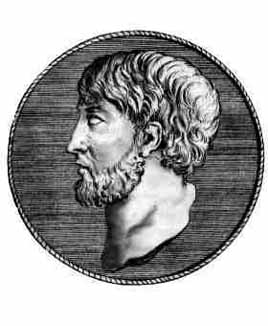
1. To Apeiron
is not a thing.
2. That which
is not a thing is nothing.
3. Something
cannot arise out of nothing; therefore,
4. To Apeiron
cannot be the cause of all things.
5. Air/soul is the
basic nature of reality. (animism)
6.
Gases are expanding air. Solids are condensed air.
Expansion causes heat. Condensing causes coldness.
7.
Diogenes of
Apollonia was a student of Anaximenes.
.......................................................
3.
We accepted the belief that reality can not be
created out of nothing, and it cannot perish into
nothing. This lead modern physics to the belief in
the conservation of matter.
ARGUMENTS:
1. To Apeiron
is not a thing.
2.
That which is not a thing is nothing; therefore,
3. To Apeiron
is nothing.
1. To Apeiron
is nothing.
2. Nothing
cannot cause something to exist; therefore,
3. To Apeiron
cannot cause something to exist.
1. To Apeiron
cannot cause something to exist.
2.
What cannot cause something to exist cannot be
the cause of all things; therefore,
To Apeiron
cannot be the cause of all things.
Perelman,
CH.: 1966, An Introduction to
Philosophical Thinking, New York, Random
House, Inc., p9.
PYTHAGORAS (570-495 BCE)
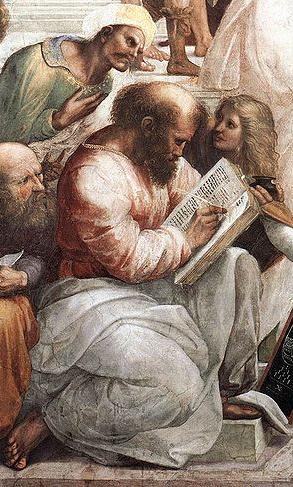
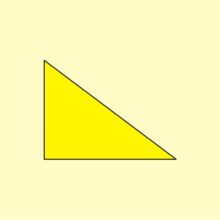
1.
Philosophy is the love of Wisdom.
2. Math
is the language of the Universe. (form over matter)
3. The
soul is immortal.
4. We
can only escape reincarnation by purifying the
soul.
LIFE:
Born on the Island of Samos.
He
migrated to Croton Italy.
He
founded a religious sect that took a vow of secrecy.
He discovered the Pythagoream
theorem.

The Pythagorean theorem: The sum
of the areas of the two squares on the
legs ( a and b) equals the
area of the square on the hypotenuse ( c).
XENOPHANES OF
COLOPHON
(570-478 BCE)
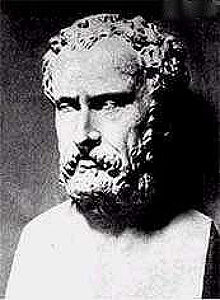
1. There is
no certainty. (the beginning of epistemology)
2. God is
one, unchanging, and eternal (monotheism).
3. God is
total mind and thought.
4. God's
awareness and knowledge are instantaneous.
5. God thinks
the universe into motion.
.............................................................
1.
We have probable knowledge.
LIFE:
Born in Colophon
Migrated to Italy
Taught Parmenides
Banished to Sicily.
Lived to an old age.
Philip Wheelwright,
in The Presocratics p.31-39, tells us that
Xenophanes was the first critical theologian in
Greece. He believed that God is one, and God is
completely different from humans. Weelwright
declares that Xenophanes was interested in theology.
He was not interested in metaphysics. He was a
monotheist. He was not a metaphysical monist.
Wheelwright says, "He does not say that all being is
one and that plurality is impossible...; he confines
himself to proclaiming the doctrine of God as single
and transcendent," (31). Parmenides was a
metaphysical monist.
TESTIMONY
Diogenes Laertius:
Xenophanes holds that
God is spherical in substance, and that he is unlike
men; for the whole of him sees, the whole of him
hears, he does not breath, he is totally mind and
thought, and is eternal.
Simplicious
Commentaria:
Theophrastus says
that Xenophanes of Colophon, teacher of Parmenides,
declared that the first principle is one, and that
What Is is one and all-embracing, that it is neither
limited nor unlimited, and neither moving nor at
rest.
Galenus:
Xenophanes ... had
skeptical doubts about everything except his own
dogma that all things are one, and that this One is
God, who is limited, rational, and immovable.
Pseudo-Plutrarch
Stomata:
Xenophanes ... denied
that there is any coming-to-be or perishing,
declaring that All is always the same. For if it had
come-to-be it could not have existed before that
moment when the coming-to-be occurred; but on the
other hand not-being could not have come-to-be,
because not-being has no power to bring anything
about. Declaring that our senses are deceptive he
even challenges the authority of reason itself.
Hipopolytus:
Xenophanes ... was
the first to declare that nothing can be grasped
with certainty, arguing: "Even if someone happened
by chance to say what is true, he still could not
know [whether he was right or not]; yet all men have
the illusion of knowing" [Fr. 10]. He says that
nothing comes-to-be or perishes, that nothing is
moved, and that the universe is one and changeless.
God is eternal and one, homogeneous throughout,
limited, spherical, and with the power of perception
in all his parts.
HERACLITUS OF EPHESUS
(540-480 BCE)
On Nature

1. Knowledge
comes from experience.
2. Fire is
the basic nature of reality.
3. Everything
is in motion.
4. Permanence
is an illusion.
5. There are
no separately existing things.
6. Things
that change cannot be known.
7. The
universe is all being and all touching.
8. all things
are one - Logos.
9. Only God
has wisdom.
...................................
3. "Nothing
ever is, everything is always in a state of
becoming," (Plato).
"Everything flows and
nothing abides; everything gives way and nothing
stays fixed, (70).
"You cannot step
twice into the same river ... ," (71).
"It is in changing
that things find repose," (71).
"[If strife were to
perish] ... all things would cease to exist," (71).
"War is the father of
all ... ." (The Naked Ape)
7. There is
no place were there is nonbeing.
8. From out
of all the many particulars comes oneness, and out
of oneness come all the many particulars, (78).
The one is God, and
it has more reality than the many.
"The Logos is common
to all. Yet ... men live as if each of them had a
private intelligence of his own," (69).
"Although intimately
connected with the Logos, men keep setting
themselves against it," (74)
Everything is
composed out of soul. It is in a constant state of
flux. (72)
9. Pythagoras
(6th century B. C. E.) argued; since only God
possesses true Wisdom, we can only hope to be lovers
of Wisdom. He is the first to define philosophy as
the love of Wisdom.
"Wisdom is one ... ,"
(79).
"Much learning does
not teach understanding ... ," (69)
"Human nature has no
real understanding," (74).
"Man is not
rational," (74)
LIFE:
Born in Ephesus.
He was a misanthropist.
PARMENIDES OF ELEA
(515-450 BCE)
Parmenides
by Plato

1. Reason is
the proper guide to truth.
2. What is
is.
3. What is
not is not.
4. Being is
one.
5. Being is
unchanging.
......................................
2. Only Being
exists; nothingness does not exist.
4. Is reality
one or many?
Does reality
change, or is it static?
The whole is like
(not is) a limited sphere. All of its exterior
points are equi distant from its center point.
His student Melissus
argued that Being cannot be a sphere because
nothingness would have to surround it. Being must be
infinite in time and space.
5:
1. If there is
a plurality of things, then nothingness exists.
2. Nothingness
cannot exist; therefore
There is no plurality
of things.
1. If there is
movement, then nothingness exists.
2. Nothingness
cannot exist; therefore
There is no movement.
1. M > N
2.
~N / ~M
3.
~M 1,2 mt
1. If there is
movement, then a void exists.
2. There is
movement; therefore
A void exists.
1. M >
V
2. M
/
V
3.
V 1,2 mp
1. If there is
a plurality of things, then a void exists.
2. There is
a plurality of things; therefore
A void exists.
1. P >
V
2. P
/
V
3.
V 1,2 mp
LIFE:
Elea was in southern
Italy.
He was a pupil of Xenophanes.
ZENO OF ELEA
(490-430 BCE)
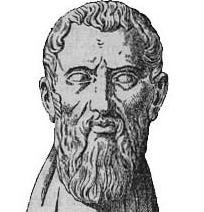
LIFE:
He was 25 years
younger than Parmenides.
He invented the
reductio ad absurdum to prove Parmenidies' doctrine.
The argued that the
belief that there is a plurality of things results
in absurdities.
.........................................................................................................
The Paradoxes of Motion
Edward
Muybridge
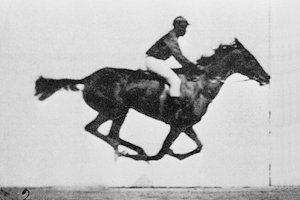
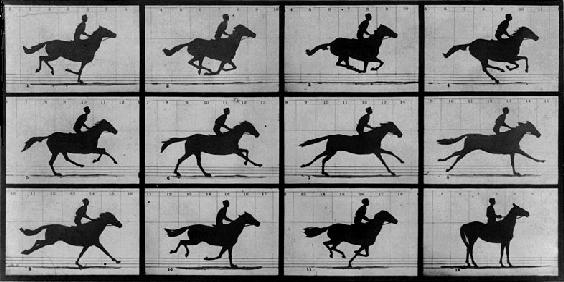

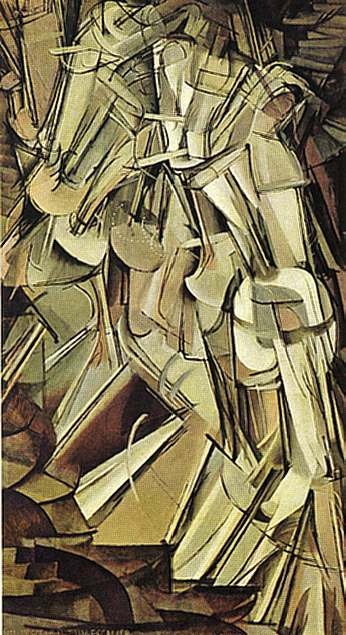
Nude Descending a Staircase
Marcel Duchamp, 1912
The Arrow Paradox
“ If everything when it occupies an equal space is
at rest, and if that which is in locomotion is
always occupying such a space at any moment, the
flying arrow is therefore motionless. ”
—Aristotle, Physics VI:9, 239b5
Zeno abolishes motion, saying "What is in motion
moves neither in the place it is nor in one in which
it is not". (Diogenes Laertius Lives of Famous
Philosophers, ix.72)
Imagine an arrow in flight. At any
moment we can say that it is at rest, and it
occupies some space. Then when does it move? In any
instant of time there is no motion occurring because
an instant is a snapshot.
Achilles and the Tortoise
“ In a race, the quickest runner can
never overtake the slowest, since the pursuer must
first reach the point whence the pursued started, so
that the slower must always hold a lead. ”
—Aristotle, Physics VI:9, 239b15
Achilles gives the tortoise a head start. After some
time, Achilles will reach the tortoise's starting
point. During this time, the tortoise will have
advanced some distance. It will then take Achilles
some further time to run that distance. By that time
the tortoise will have advanced farther, and then
more time still to reach this third point while the
tortoise moves ahead. Thus, whenever Achilles
reaches somewhere the tortoise has been, he still
has farther to go. Because there are an infinite
number of points Achilles must reach where the
tortoise has already been, he can never overtake the
tortoise.
The Dichotomy Paradox
The argument is called the Dichotomy because it
involves repeatedly splitting a distance into two
parts. Suppose you want to catch a stationary bus.
Before you can get there, you must get halfway there
- to its halfway point. Before you can get halfway
there, you must get a quarter of the way there.
Before traveling a fourth, you must travel
one-eighth; before an eighth, one-sixteenth; and so
on. This requires that you complete an infinite
number of tasks - which is impossible.
This sequence also presents a second problem in that
it contains no first distance to run, for any
possible (finite) first distance could be divided in
half, and hence would not be first after all. Hence,
the trip cannot even begin. The paradoxical
conclusion then would be that travel over any finite
distance can neither be completed nor begun, and so
motion is an illusion.
Paradox of Place:
"… if everything that exists has a place, place too
will have a place, and so on ad infinitum."
Paradox of the Grain of Millet:
Suppose you drop a sack of millet.
When it hits the floor, it will make a sound, but if
you drop a single grain, it will not make a sound.
It could be that the notion of primary and secondary
substances was a proposed solution to this paradox.
The Moving Rows:
For an expanded account of Zeno's arguments as
presented by Aristotle, see Simplicius' commentary
On Aristotle's Physics.
Proposed Solutions:
Aristotle (384 BC−322 BC) remarked that as the
distance decreases, the time needed to cover those
distances also decreases, so that the time needed
also becomes increasingly small. Aristotle's
proposed solution for the paradoxes involves
distinguishing "things infinite in respect of
divisibility" (such as a unit of space that can be
mentally divided into ever smaller units while
remaining spatially the same) from things (or
distances) that are infinite in extension ("with
respect to their extremities").
Saint Thomas Aquinas offered the following solution
to the arrow paradox: " Instants are not parts of
time, for time is not made up of instants any more
than a magnitude is made of points, as we have
already proved. Hence it does not follow that a
thing is not in motion in a given time, just because
it is not in motion in any instant of that time."
Peter Lynds argues that instants in time do not
exist. An object in relative motion cannot have a
determined position. If it did, it could not be in
motion.
Another possible solution is to reject the idea that
between any two points in space or time there is
always another point. Without this assumption there
are only a finite number of distances between two
points.
Reichenbach points out that the paradox arises from
considering space and time as separate entities.
Einstein's theory of general relativity states a
single space-time continuum.
EMPEDEOCLES OF SICILY (495-435 BCE)
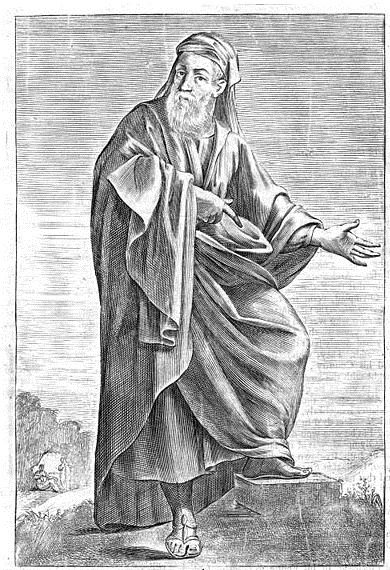
1. Perception
is the result of particles bouncing, or flying, of
of objects, and striking our sense organs. Blue is
the result of blue particles.
2. Empty
space, or a void, does not exist.
3. Reality is
a sea of undulating toughing particles.
4. Life goes
through random variations. Advantageous variations
survive.
ANAXAGORAS OF
CLAZOMENAE (500-428 BCE)
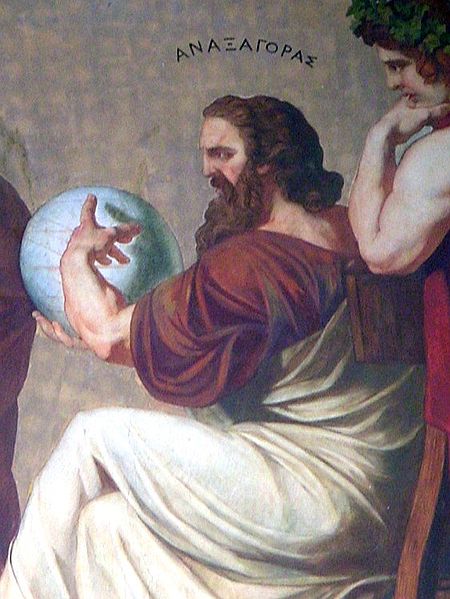
1. Mind
(Nous) is the basic nature of reality.
2. Nothing
comes into being out of nothing.
3. Objects
have a share of everything in them.
4. All things
are present.
5. Things are
infinite in number.
6. Things are
infinite in size.
7. Stars are
distant suns.
8. The sun is
molten stone.
9. The moon
is made of earth, and reflects the sun's light.
...........................................
He was a teacher and
friend or Pericles.
The enemies of
Pericles charged, tried, and convicted Anaxagoras
for impiety.
He escaped, and
returned to Ionia.
...........................................
1. The world
order was produced by reason.
3. Since
there are many things in the world, and nothing
comes into being out of nothing, everything that comes into existence must
be present in the things that they come out of.
LEUCIPPUS

1.
Everything is composed of atoms moving in a void.
2. Atoms are
eternal, unchanging, and inseparable.
3. The void is
infinite, eternal, and unchanging.
......................................
1. I movement
exists, then a void must exist.
2. Movement does
exist / Therefore a void exists
1. M > V
2. M /
V
3. V
1,2 mp
LIFE:
He was an Ionian -
probably born in Miletus. The dates are unknown.
Leucippus
was the first to formulated the atomic theory for reality.
He was the teacher
of Democritus.
His lost works
were Megas Diakosmos (The Great Order of the
Universe) and Peri Nou (On mind). A single fragment
survived:
Nothing happens at random, but everything from
reason and necessity.
—Leucippus, Diels-Kranz 67 B2
This sentence is the first expression of the
Principle of Sufficient Reason.
DEMOCRITUS
(460-360 BCE)
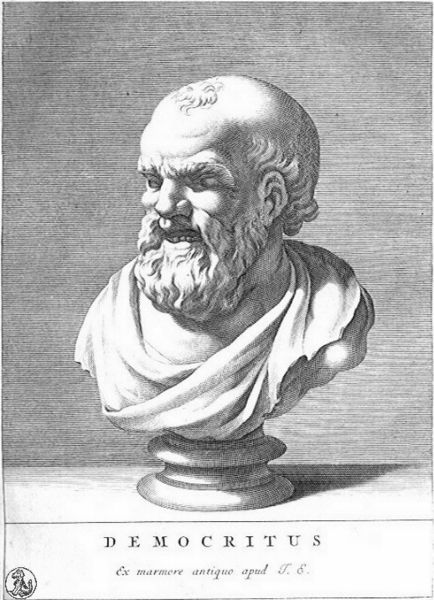
1.
Something cannot arise from nothing.
2.
Change is real; it's not an illusion.
3.
Everything is made of atoms moving in a void. (There
is no soul)
Atoms are indivisible, unchanging, eternal, and
infinite.
The void is infinite empty space.
4.
Atoms have different shapes. Solids are interlocked
atoms.
Liquids are made of smooth round atoms.
5.
Atoms lack color, smell, taste, odor, and
temperature.
Sweetness is caused by smooth atoms -
bitterness by sharp atoms.
6.
The senses provide indirect subjective knowledge.
7.
Moderation produces calmness and pleasure.
8.
Excess causes agitation and pain.
9.
Pleasure is the only value.
Calmness is the highest pleasure.
(prudent hedonism)
............................................
LIFE:
Born in Abdera.
The pupil of
Leucippus.
He traveled to
Asia, India, Egypt, and Ethiopia.
|
